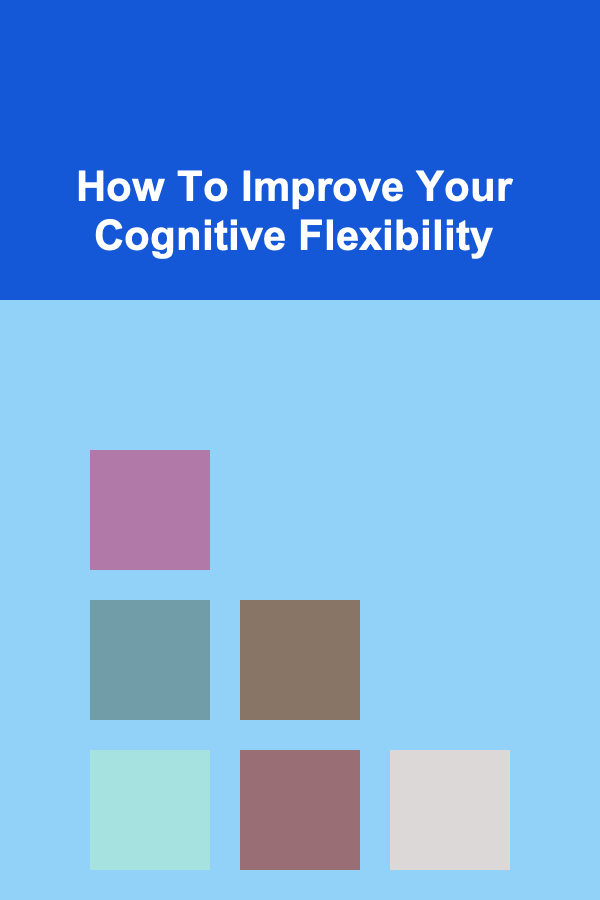
How To Improve Your Cognitive Flexibility
ebook include PDF & Audio bundle (Micro Guide)
$12.99$10.99
Limited Time Offer! Order within the next:

Cognitive flexibility is the ability to adapt your thinking to new, changing, or unexpected events, situations, or stimuli. It's a vital cognitive skill that allows us to shift between thinking about different concepts, perspectives, and tasks effectively. In a world that constantly demands us to adjust to new information, experiences, and challenges, cognitive flexibility is more important than ever. Whether in personal decision-making, problem-solving, or navigating complex work environments, improving cognitive flexibility can enhance creativity, reduce stress, and improve overall mental well-being.
This article will explore how to improve cognitive flexibility, what it involves, and why it is essential for personal and professional growth.
Understanding Cognitive Flexibility
Before diving into ways to enhance cognitive flexibility, it's essential to understand what it entails. Cognitive flexibility is part of executive function, which refers to a set of mental skills used to plan, focus, remember instructions, and juggle multiple tasks. Cognitive flexibility, specifically, allows a person to:
- Switch between different concepts or tasks effectively.
- Adjust to new information or changes in circumstances quickly.
- Consider multiple perspectives on a given issue.
- Solve problems in innovative ways by not sticking rigidly to previous methods.
- Adapt thinking patterns based on feedback or new experiences.
For example, imagine you are working on a project and suddenly receive new information that requires a change in direction. A person with high cognitive flexibility can pivot easily, adjust their plan, and move forward with minimal stress. Someone with low cognitive flexibility might get stuck in their ways, struggling to make the necessary adjustments, resulting in inefficiency or frustration.
The Importance of Cognitive Flexibility
Cognitive flexibility plays a significant role in various aspects of life, such as problem-solving, creativity, and emotional regulation. Here are some reasons why cognitive flexibility is essential:
1. Improved Problem-Solving Skills
The ability to view a problem from different angles is essential for finding creative solutions. Those with high cognitive flexibility can break free from conventional approaches and generate new ideas more effectively. In professional settings, this can be especially valuable in brainstorming sessions, innovation, and managing complex projects.
2. Adaptability in a Changing World
In today's fast-paced world, change is inevitable. Whether it's in technology, societal norms, or personal life situations, the ability to adapt to change is crucial. Cognitive flexibility helps individuals cope with uncertainty and navigate transitions, reducing stress and increasing overall resilience.
3. Better Emotional Regulation
Cognitive flexibility is also linked to emotional regulation. When faced with stressful or emotionally charged situations, those with cognitive flexibility can adapt their thinking to manage their emotional responses. For instance, if a person is feeling frustrated with a task, they may reframe their thoughts, shift their focus, or use a different approach to improve their emotional state.
4. Enhanced Learning and Memory
Cognitive flexibility allows individuals to integrate new information effectively, which improves learning outcomes. It helps you retain new knowledge while integrating it with existing knowledge, leading to better retention and understanding. For example, in academics, being able to adjust to different teaching methods or learning environments can enhance academic performance.
5. Effective Communication and Relationship Building
In both personal and professional relationships, understanding multiple perspectives is essential for conflict resolution and effective communication. Cognitive flexibility enables individuals to see things from another person's point of view, making it easier to empathize and negotiate, thereby strengthening relationships.
Ways to Improve Your Cognitive Flexibility
Improving cognitive flexibility takes time and effort, but the benefits it brings to personal growth and mental agility are well worth it. Here are several strategies to enhance this essential cognitive skill:
1. Challenge Your Comfort Zone
One of the best ways to improve cognitive flexibility is to step out of your comfort zone and expose yourself to new experiences. Engaging in activities that are unfamiliar or require a different approach can stimulate your brain and improve mental adaptability. For example:
- Traveling to a new country exposes you to different cultures and ways of thinking.
- Learning a new language forces your brain to process information in a completely different way.
- Trying new hobbies or exploring new skills helps expand your thought patterns and challenges your conventional methods of problem-solving.
2. Practice Mindfulness and Meditation
Mindfulness and meditation practices can help train your brain to stay in the present moment and be less rigid in your thinking. By being mindful, you become more aware of your thoughts and reactions, making it easier to reframe your perspective when challenges arise. Mindfulness helps break patterns of rigid thinking and promotes mental flexibility.
Some techniques include:
- Focused breathing to calm the mind and bring awareness to the present moment.
- Body scan meditation to connect with physical sensations and notice areas of tension or discomfort.
- Loving-kindness meditation to enhance empathy and emotional flexibility.
3. Learn to Embrace Uncertainty
Uncertainty is often a major barrier to cognitive flexibility. Many individuals struggle to adapt because they want clear answers and predictable outcomes. Learning to embrace uncertainty is key to becoming more cognitively flexible. Instead of becoming frustrated or anxious in uncertain situations, practice tolerance and adaptability by:
- Reframing uncertainty as an opportunity for growth rather than something to fear.
- Accepting that not all situations have clear answers and that it's okay to be unsure.
- Building resilience by facing challenges head-on without rigidly clinging to prior knowledge or expectations.
4. Engage in Mental Workouts
Just as physical exercise strengthens your muscles, mental exercises can enhance cognitive flexibility. Regularly engaging in activities that challenge your brain helps keep it agile. These exercises can include:
- Puzzles such as Sudoku, crosswords, or logic games that encourage pattern recognition and problem-solving.
- Strategy games like chess or board games that require you to think ahead and adjust your strategies.
- Brain-training apps that offer exercises specifically designed to improve cognitive functions such as memory, attention, and flexibility.
5. Adopt a Growth Mindset
A growth mindset, a term coined by psychologist Carol Dweck, is the belief that abilities and intelligence can be developed with effort and persistence. This mindset encourages flexibility in thinking, as you view challenges as opportunities to learn rather than obstacles to avoid. To cultivate a growth mindset:
- Focus on effort over outcome: Praise the process of learning and problem-solving rather than just the results.
- Embrace mistakes: View failures as valuable lessons that help improve future performance.
- Stay open to feedback: Accept constructive criticism and use it to adjust your approach.
6. Diversify Your Learning
The more diverse your experiences and knowledge, the more flexible your thinking becomes. Constantly exposing yourself to new information broadens your worldview and allows you to approach problems from different perspectives. You can do this by:
- Reading widely: Explore books and articles on diverse topics, including subjects outside your area of expertise.
- Engaging with people from different backgrounds: Build relationships with people who have different experiences and perspectives.
- Participating in discussions or debates: Challenge your ideas and beliefs by discussing them with others, which encourages you to consider alternative viewpoints.
7. Cultivate Emotional Intelligence
Cognitive flexibility is closely linked to emotional intelligence (EQ), which involves understanding and managing your emotions as well as the emotions of others. Developing emotional intelligence can make it easier to switch between perspectives and adapt to changing emotional situations. To improve EQ:
- Increase self-awareness: Recognize your emotions and their impact on your thoughts and actions.
- Practice empathy: Try to understand others' emotions and viewpoints.
- Develop self-regulation: Learn to manage your emotional responses in challenging situations.
8. Set Flexible Goals
While having goals is important, it's equally important to remain flexible in how you achieve them. Rigid goal-setting can limit creativity and adaptability. To set flexible goals:
- Use broad, flexible goals that allow for adjustments in how they are achieved.
- Break down large goals into smaller, adaptable steps that can evolve as circumstances change.
- Review and adjust goals regularly to ensure they remain relevant and achievable.
9. Practice Cognitive Reframing
Cognitive reframing involves changing your perspective on a situation to view it in a more positive or different light. This skill helps improve cognitive flexibility by teaching you to shift your thoughts and reactions. To practice cognitive reframing:
- Identify negative or fixed thoughts you may have about a situation.
- Challenge those thoughts by asking if there's another way to view the situation.
- Replace negative thoughts with more balanced or constructive alternatives.
10. Embrace Failure and Experimentation
Finally, remember that failure is not the opposite of success; it's a part of it. Those who are open to experimenting, making mistakes, and learning from them tend to be more cognitively flexible. By embracing failure as a learning opportunity, you allow yourself the freedom to explore new ideas, make adjustments, and improve over time.
Conclusion
Improving cognitive flexibility is a lifelong process that requires practice and self-awareness. By embracing new challenges, developing emotional intelligence, practicing mindfulness, and adopting a growth mindset, you can train your brain to think more flexibly, adapt to change more efficiently, and improve problem-solving abilities. Whether in personal relationships, career development, or managing everyday challenges, cognitive flexibility is a powerful skill that can help you navigate the complexities of life with greater ease and resilience.
Reading More From Our Other Websites
- [Personal Care Tips 101] How to Use Toner to Control Excess Oil Throughout the Day
- [Home Holiday Decoration 101] How to Style Your Christmas Tree with Unique Themes
- [Personal Finance Management 101] How to Invest in the Stock Market for Beginners
- [Organization Tip 101] How to Use Color-Coding to Organize Bookshelves
- [Home Holiday Decoration 101] How to Create a Luxurious Holiday Look on a Budget
- [Metal Stamping Tip 101] Best Solutions for Stamping Composite‑Metal Hybrid Parts in the Aerospace Industry
- [Organization Tip 101] How to Optimize Space in a Galley Kitchen
- [Organization Tip 101] How to Organize Clothing for Different Body Types
- [Organization Tip 101] How to Identify and Get Rid of Unused Inventory Items
- [Home Pet Care 101] How to Spot and Address Early Signs of Dental Problems in Pets

How to Keep Your Dining Room Decor Minimal and Chic
Read More
How to Save Money on Groceries Without Cutting Quality
Read More
How to Winterize Your Home for Energy Efficiency
Read More
The Pros and Cons of Utilizing Public Wi-Fi for Internet Access
Read More
How To Improve Your Energy Levels Naturally
Read More
10 Tips for Winterizing Your Container Garden
Read MoreOther Products

How to Keep Your Dining Room Decor Minimal and Chic
Read More
How to Save Money on Groceries Without Cutting Quality
Read More
How to Winterize Your Home for Energy Efficiency
Read More
The Pros and Cons of Utilizing Public Wi-Fi for Internet Access
Read More
How To Improve Your Energy Levels Naturally
Read More